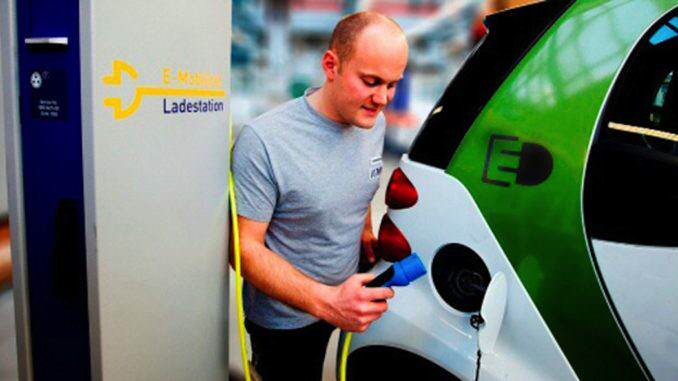
Bosch is presenting mobility innovations “Invented for life” at the 43rd Tokyo Motor Show. The technologies satisfy the increasing global demand for accident prevention and environmental protection. “Our Automotive Technology business sector is currently gaining significant momentum. We expect its operative sales to grow by 5 percent in 2013 – faster than global automobile production. Business is particularly strong in Asia Pacific, where we expect to grow by around 10 percent in local currencies,” stated Wolf-Henning Scheider, the management board member of Robert Bosch GmbH responsible for the Automotive Group, at a press briefing at Tokyo Big Sight. “At Bosch, we foresee that electrification, automation, and connectivity are the main trends in automotive development, and we are at the forefront of innovation in all three areas,” he added.
Clean and economical mobility through electrification
On the road to electric driving, Bosch is realizing major solutions with mild, strong, and plug-in hybrids, as well as with the purely electric drive. This fits with the strategy of the Japanese government which aims to raise the market share of “next generation vehicles” to around 20 to 50 percent by 2020, and to around 50 to 70 percent by 2030.
At this year’s Tokyo Motor Show, Bosch is showcasing its complete range of innovations such as a system for plug-in hybrids which can reduce CO2 emissions by 65 percent. By 2014, powertrain electrification components will be in regular production at Bosch for 30 projects. “With these projects we are gaining experience in bringing high-performance, cost-efficient electric powertrains to the mass market”, Scheider said. “Step by step we are realizing full electromobility.”
Batteries remain a key technology for enabling the further electrification
of vehicles. Bosch aims to halve the costs of lithium-ion batteries while doubling energy density by the end of this decade, primarily through high-precision battery control technology as well as innovative electrochemical and materials technology. To accelerate the pace of these developments, Bosch recently signed a joint venture agreement with the Japanese companies GS Yuasa and Mitsubishi Corporation.
Automated driving functions: improving safety and comfort
Although fully-automated driving is still on the horizon, Bosch already offers an increasing number of safety and driver assistance functions. “We believe that automated driving will help us achieve the vision of safe and accident-free driving. Injuries should be a thing of the past, and ideally there should be no accidents at all,” Scheider said. Over 90 percent of accidents worldwide are caused by human error. In Japan, 74 percent of accidents are caused by drivers failing to observe safe driving practices. In 2012, 40 percent of fatal accidents in Japan involved elderly drivers – a rise of 3 percent over 2011, according to the National Police Agency. Bosch products already help to reduce these numbers significantly.
Automation can also make driving a more comfortable experience. Japanese drivers are said to waste on average up to 30 hours per year in traffic jams. Driver assistance systems such as ACC adaptive cruise control have already helped to make traffic smoother. In 2014, Bosch will launch a traffic jam assistant which allows cars to maintain the appropriate distance from other vehicles by adjusting their speed to congestion levels and keeps them within lane markings via steering intervention. Bosch plans to develop increasingly sophisticated automated driving functions before aiming for a fully-automated driving experience within the next decade.
Connected driving: networking cars with their surroundings
An important prerequisite for full automation is connected driving. Bosch puts a focus on car-to-cloud connectivity, which will see vehicles maintain constant connections with high-speed mobile data networks. By 2025, Bosch expects nearly every new car sold worldwide to be capable of this.
Connectivity inside the car also makes driving safe and comfortable. At the Tokyo Motor Show, Bosch will be presenting “mySpin,” a new system that integrates smart phone apps into car displays exactly as they appear on the phone. This enables drivers to operate them safely and easily while driving. “These innovations will be attractive to young drivers who value mobile internet connections. In addition, it helps to prevent accidents,” Scheider said.
Entire spectrum of motorcycle safety systems
Bosch is dedicated to developing technologies which make driving more comfortable, safer, and more efficient. The largest research center for active safety systems outside Germany is located in Yokohama. Above all, it specializes in motorcycle systems.
The products developed in Yokohama cover the entire spectrum of motorcycle safety. The MSC motorcycle stability control is a sophisticated, high-tech safety system for premium motorcycles which reduces the risk of accidents even when braking hard in bends. The ABS 9M light is a cost-effective ABS variant that controls only the front wheel and is aimed at the Asian mass market. As low-cost two-wheelers are the primary means of transport in much of Asia, this affordable innovation has the potential to dramatically decrease road fatalities and injuries across the region. This is an example of what Bosch means with its strategic imperative “Invented for life.”
Strong partner for globalized carmakers
To maintain a strong and sustained position in the global market, Japanese carmakers are striving to enhance their technological leadership, especially in the field of electrification. Like other international carmakers, they are also increasing their investment in emerging markets. With its global footprint and innovative strength, Bosch is well-positioned to take advantage of this opportunity to achieve strong growth and is currently expanding its global network. In 2013 alone, Bosch has opened three major new sites in China. It is currently building a new manufacturing site in Indonesia for Gasoline Systems products as well as extending its manufacturing facility in Thailand.

